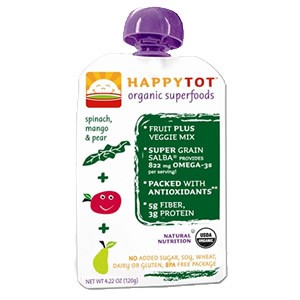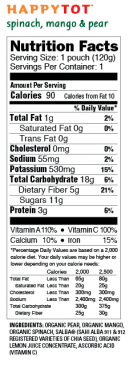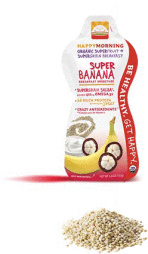Fooducate Blog - Kids Eat Q&A: Puree Pouches |
| Posted: 27 Mar 2012 05:28 AM PDT New here? Get Fooducated with our iPhone or Android App! Or try Fooducate on the Web! This is a guest blog post by Dr. Dina R. Rose Puree pouches are all the rage right now. And not just for little kids either. My almost 11 year old daughter squeezes one into her mouth for snack at least twice a week. That’s why I was particularly glad to get this question from Molly: What is your opinion of what we call around our house “mish mash,” those little pouches of pureed fruits or fruit-and-veggie combos, usually organic, that are sold by Plum, Ellas, Trader Joe’s, etc. that kids eat/suck straight from the pouch? My kids freaking love these things– they’d eat them multiple times a day if I let them (though I limit them to one per day, because they’re not cheap!), they don’t have sugar, and we always get the kind that have some kind of veggies in them (e.g., spinach peas & pears; or apple carrot), so I think of it as a way to get a little more veggies in their diet. The problem with puree pouches is that they lull parents into thinking their children are eating fruits and vegetables. They’re not. OK, technically, there are fruits and vegetables in these pounches. Typically, more fruit than veggies. But even if these pouches were packed to the spout with peas and carrots I would still advise people to tread carefully. To the extent that puree pouches replace other kinds of snacks—Goldfish crackers, cookies, fruit strips, etc.—they’re a nutritional, and a habits, step up. (That’s why I use them.) How?
This is particularly true if you are parenting a picky or a sensory sensitive eater. Research shows that purees don’t control hunger as well as actual fruit. In at least one study, apples have been shown to increase satiation more than applesauce and more than apple juice. No matter what manufacturers try to sell you, different forms of fruit are not equivalents. They’re not equivalent when it comes to shaping kids’ habits either. It’s not just that the apples have more fiber. There’s something about chewing on the whole fruit that works magic. It’s eating whole fruit that is the habit you want to foster. Read An Apple a Day? and Should Your Kids Drink Their Veggies? Puree Pouches are a good snack option if they are part of a snack rotation. I strongly advocate that parents implement The Rotation Rule: No identical foods two days in a row. The Rotation Rule is vitally important because it:
Variety is the only thing researchers have consistently found that counters the inclination toddlers have to narrow what they eat. Remember, variety doesn’t mean new. It means different. You can serve different snacks simply by rotating through what your child already eats.
Read How Brands Bite You in the Butt! and House Building 101. When it comes to puree pouches, nothing is what it seems.
Happy Tot Spinach, Mango & Pear is made from more Pear than Mango, and more Mango than Spinach. It should be called Pear, Mango & Spinach, but it probably wouldn’t sell as well. (Ingredients are listed in proportional order.) Happy Morning Super Banana Breakfast Smoothie contains more Apple than Banana—and a whole lot of other stuff too: Organic Apple, Organic Banana, Water (for Protein Addition), Organic Mangosteen, Organic Whey Protein Concentrate, Dehydrated Organic Nonfat Yogurt (Organic Nonfat Milk Solids, Lactic Acid, Cultures, Natural Flavor), Organic Salba (Sahi Alba 911 & 912 Registered Varieties of Chia Seed) (Chia), Organic Quinoa, Malic Acid, Organic Natural Mangosteen Flavor, Pectin, Ascorbic Acid [Vitamin C]. And yes, Molly, even Ella’s Broccoli, Pears, and Peas is made from more Pears than Peas and more Peas than Broccoli. I’m sorry to be the bearer of bad news, but don’t despair. You can still pack a pouch when you’re on the go. Just don’t do it every day. And remember, think of puree pouches as a crappy-snack alternative, not a substitute for actual veggies. You’ll be teaching your kids the truth, and shaping their habits for a lifetime of healthy eating. ~Changing the conversation from nutrition to habits.~
Get Fooducated: Follow us on twitter: twitter.com/fooducate on facebook: facebook.com/fooducate |
| You are subscribed to email updates from Fooducate To stop receiving these emails, you may unsubscribe now. | Email delivery powered by Google |
| Google Inc., 20 West Kinzie, Chicago IL USA 60610 | |







No comments:
Post a Comment